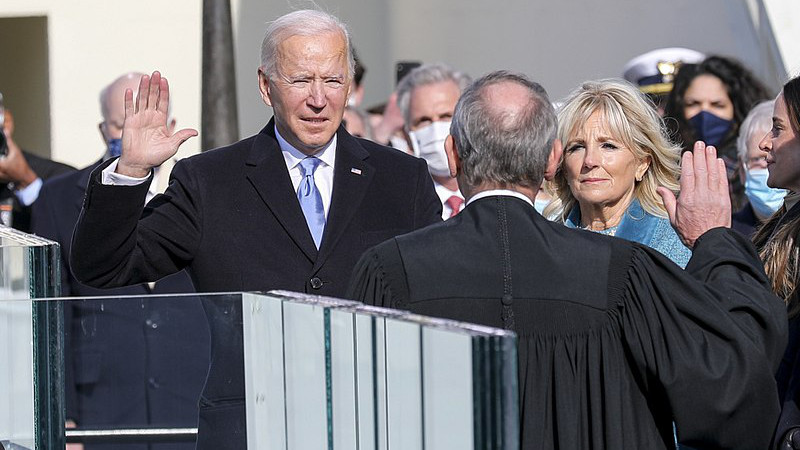
- Select a language for the TTS:
- UK English Female
- UK English Male
- US English Female
- US English Male
- Australian Female
- Australian Male
- Language selected: (auto detect) - EN
Play all audios:
The speech of this week was not about Brexit or Covid. Tucked away lower down on some news bulletins was the report of the ceremony in Oslo awarding the Nobel Peace Prize to the UN Agency,
the World Food Programme (WFP), represented by its executive director, David Beasley. It was a just award, for a body established in 1961, and which in 2019 supported 100 million people in
88 countries, delivering 18 billion rations. It has moved far beyond handing out food, to sustainable long-term programmes that build repair and recovery into shattered communities. David
Beasley himself is someone who gives hope that America and the Republican Party can redeem itself. A former governor of South Carolina, he is as far removed from the tragedy that is the
current President, and the collection of liars and fantasists embarrassing themselves over the election that they have fortunately lost, as can be imagined. Beasley is a tough act,
convincing President Trump to stay on board with its financing of the WFP in 2017 when perhaps no other figure could have done so, while at the same time being equally forthright on the need
to make more efficient and effective the organisation he was leading – sacred cows and international treasures can no longer get away with just a title and a rosy virtuous glow. His speech
this week firstly dared to talk of love as a motivating factor in the agency’s work. In the harsh world of modern famine, love is usually left to celebrities, but not Beasley. He spoke
boldly of love without embarrassment or gush as a fundamental religious value uniting the world, and of the giving of food to those in need as a sacred, non-transactional, act. And secondly,
he took on wealth full square, saying: “We stand at what may be the most ironic moment in modern history. On the one hand – after a century of massive strides in eliminating extreme
poverty, today 270 million people are on the brink of starvation. That’s more than the entire population of Western Europe. On the other hand, there is $400 trillion of wealth in our world
today. Even at the height of the Covid pandemic, in just 90 days, an additional $2.7 trillion of wealth was created. And we only need $5 billion to save 30 million lives from famine.” I
hope those MPs who are thinking of voting to reject the Conservative manifesto commitment to 0.7 per cent of gross national income to development assistance, some of whom are reminding us
today of the solemn duty to uphold the manifesto commitment to “Get Brexit Done”, take note. The undercurrent to this is the horrifying truth that the vast majority of famine being dealt
with today is man-made (and that does not need to be made gender neutral – it really is men who are responsible). In eight out of ten of the world’s main food crises, conflict and insecurity
are the main drivers; 77 million people facing the most acute hunger are in just 22 war-torn countries. Beasley makes the point that while he was honoured by the award, he was also shamed
by it, as we should all be. For the award comes at a time when the world teeters on the brink of forgetting why it has just commemorated 70 years of the United Nations: the common desire to
end conflict after the Second World War. How easy it seems to be for some to forget what caused it all. A breakdown in international order, the rise of nationalism in Europe, aggression not
confronted. The structures put in place were neither perfect, nor incapable of revision over time, but from the inability of the Security Council to bring an end to existing wars, and the
threat to existing obligations like the Nuclear Non-Proliferation Treaty, there seems every likelihood that the WFP is going to be working overtime in 2021 as well. David Beasley received
the award at the same time as he supported the call for a global ceasefire made by UN Secretary General Antonio Guterres, imploring states to use the Covid-19 crisis – a common threat – to
climb down from the confrontations which have ravaged too many lands and peoples. Beasley said: “Silence the guns, stop the air strikes, end the wars – peace and reconciliation are missing
ingredients for a world without hunger.” It was good to hear a speech on the fundamentals of world politics made with the authority of a Nobel Prize-winner, and with the integrity of one who
is delivering. But his sense of shame – which he personally has no need to feel – should be reflected elsewhere. A world that is pulling itself apart, where statecraft increasingly means
seeking polarising zero-sum success, is crying out for something different. The end of 2020 might be as good a place to start rebuilding as any. A MESSAGE FROM THEARTICLE _We are the only
publication that’s committed to covering every angle. We have an important contribution to make, one that’s needed now more than ever, and we need your help to continue publishing throughout
the pandemic. So please, make a donation._








